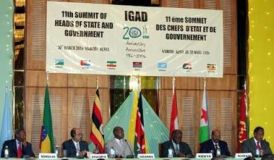Regional leaders review efforts to restore peace
Mar 20, 2006 (NAIROBI) — Six African leaders reviewed efforts to restore peace in Somalia and Uganda and attempts to resolve a festering border dispute between Eritrea and Ethiopia Monday.
 As the Nairobi summit of the Intergovernmental Authority on Development opened, Kenyan President Mwai Kibaki appealed to the international community to help fight piracy off the coast of lawless Somalia, two days after two U.S. Navy warships exchanged gunfire with suspected pirates. Suspects seized by U.S. sailors in a previous encounter are now standing trial in Kenya.
As the Nairobi summit of the Intergovernmental Authority on Development opened, Kenyan President Mwai Kibaki appealed to the international community to help fight piracy off the coast of lawless Somalia, two days after two U.S. Navy warships exchanged gunfire with suspected pirates. Suspects seized by U.S. sailors in a previous encounter are now standing trial in Kenya.
Somalia has had no effective central government, coast guard nor navy since 1991, when warlords ousted a dictatorship and then turned on each other.
A 17-month old transitional government has failed to assert its authority over a patchwork of clan-based fiefdoms, partly due to mistrust over proposals to deploy peacekeepers from neighboring Ethiopia to help disarm local militias as the government forms a new national army.
“I am convinced that the item of building a national army in Somalia is not as insurmountable as it is made out to be,” Uganda’s President Yoweri Museveni said at the meeting of the regional grouping known as IGAD.
Museveni pressed Congo to work with Uganda to combat Ugandan rebels who fled their rear bases in southern Sudan for new bases in lawless eastern Congo.
The rebel Lord’s Resistance Army, which has been waging a 20-year civil war in northern Uganda, is notorious for mutilating victims and for abducting children who are later dragooned into their army or forced to become sex slaves.
Museveni said Uganda’s cooperation with former Sudanese rebels now running an autonomous government in southern Sudan and with Sudan’s central government enabled Ugandan troops to inflict heavy loses on the Lord’s Resistance Army and chase them out of southern Sudan.
The government of Congo should cooperate “to finish this problem once and for all,” Museveni said.
Summit participants also discussed an Eritrea-Ethiopia border dispute that remains unresolved six years after the two countries signed a peace deal to end a 2 1/2-year border war.
Eritrea won independence in 1993 from Ethiopia, but their border was never officially demarcated.
Ethiopia has rejected an independent boundary commission ruling that awarded the disputed town of Badme to Eritrea, though both sides had agreed in the peace treaty to accept whatever the commission determined.
A recent diplomatic push by the United States and others brought Eritrean and Ethiopian experts to a meeting of the commission earlier this month.
“We strongly believe there is a window of opportunity to resolve the simmering tensions amicably,” Kibaki said. “Kenya firmly believes that dialogue is the only effective way of easing tensions as the first step toward the peaceful settlement of the cross-border dispute.”
Leaders also discussed plans to deal with recurrent drought in arid areas of East Africa that often leaves residents facing serious food shortages.
IGAD, which groups Djibouti, Eritrea, Ethiopia, Kenya, Somalia, Sudan and Uganda, was initially formed to further regional economic, agricultural and environmental cooperation. The 20-year-old organization has increasingly addressed the peace and security issues also seen as holding back the region’s development.
Eritrea’s president did not attend Monday’s summit, sending his agriculture minister instead.
(ST/AP)
